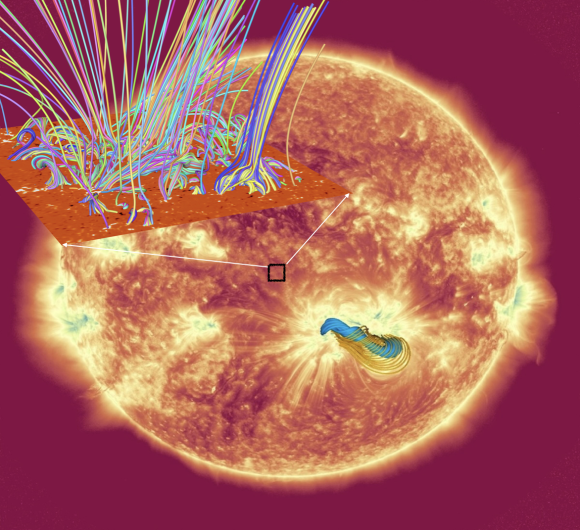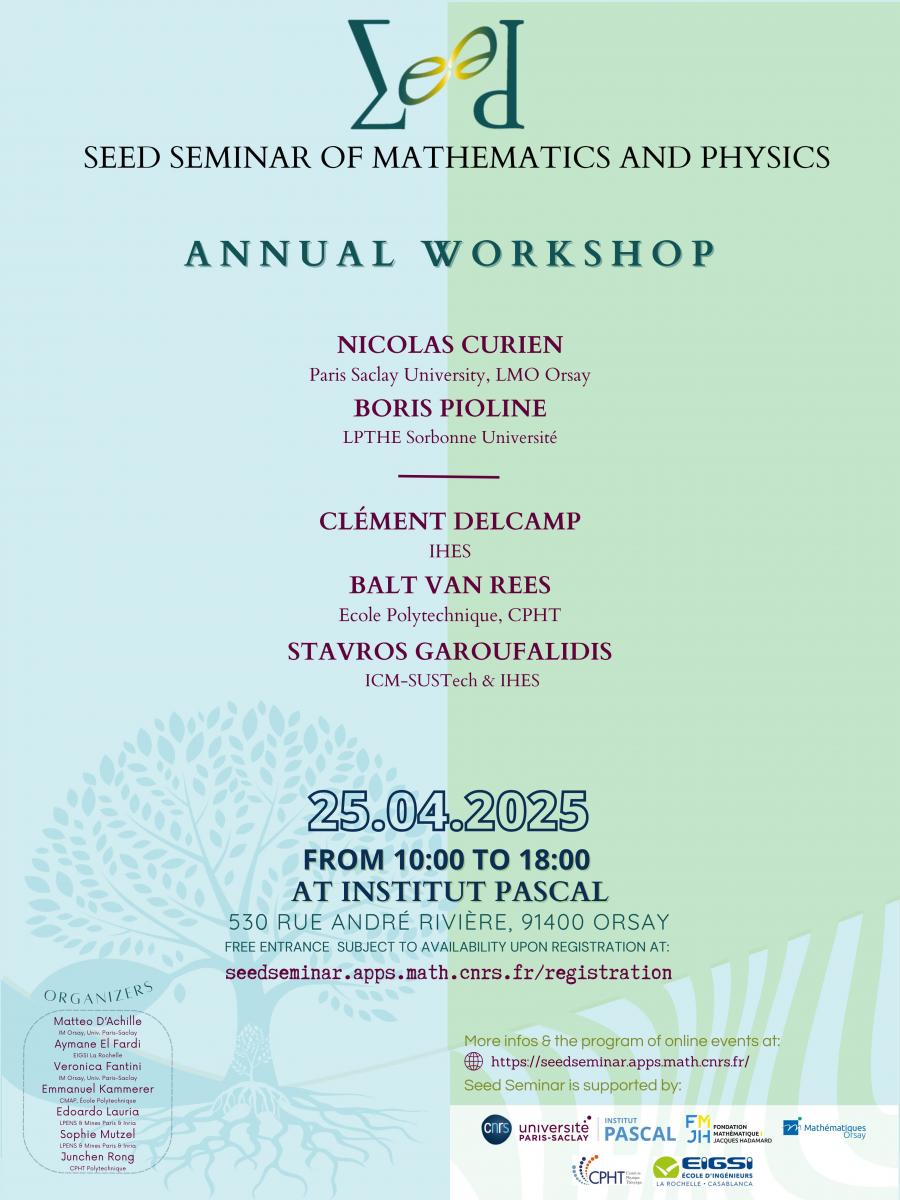Soutenance de thèse de Victor Franken
The center for Theoretical Physics (CPHT) at Ecole Polytechnique gathers research scientists working in diverse domains of fundamental and applied Physics. The overall coherence is assured by the corpus of common, transposable, mathematical and numerical methods.
CPHT is a joint research unit of CNRS and Ecole Polytechnique, and has a partnership with the Collège de France. His director is Marios Petropoulos, Senior Researcher at CNRS.
CPHT is on the campus of Ecole Polytechnique, buildings 5 and 6. The reception offices are located in building 6 , offices 06.1046 and 06.1045.
Postal Address :
CPHT
Ecole Polytechnique
91128 Palaiseau cedex
France
Secretary phone number : 01 69 33 42 01 (from abroad: +33 169 334 201)
Write an email to someone at CPHT : : firstname.lastname@polytechnique.edu
Séminaire du groupe Théorie des plasmas
Mardi 10 juin 2025 à 14h00
Salle de conférence du CMLS (bât 6)
Dr. Mufei Luo (Department of Physics, University of Oxford, UK)
"Data-Driven Nonlocal Heat Transport Modeling in Plasmas Using Neural Networks"
Séminaire conjoint LSI+CPHT+PMC = M4S
Mardi 27 mai 11h00
Salle de conférence Louis Michel (CPHT)
Benoît Fauqué
(Chargé de Recherche CNRS, LPEM, ESPCI (Paris))
Ferroelectric fluctuations shape the superconducting dome of SrTiO₃
Superconducting domes, ubiquitous across a variety of quantum materials, are often understood as a favored window for pairing, opened by fluctuations of competing orders that induce a peak in the doping evolution of the superconducting transition temperature. Yet, a quantitative understanding of how such a window closes remains lacking. In this talk, I will discuss the case of the superconducting dome in doped SrTiO₃. In contrast to other families, the parent compound is not magnetic but instead is a quantum paraelectric, characterized by a large dielectric constant (ε ≈ 20,000). I will show that its superconducting dome arises from the interplay between the increase in the density of states and the inevitable collapse of the quantum paraelectric phase—both induced by doping. I will also discuss the remarkable transport properties, such as a linear, quasi-isotropic magnetoresistance, which we observe as the quantum paraelectric phase dies off.
L'IPP a reçu 68 candidatures pour le prix IP Paris de la meilleure thèse 2025, dont beaucoup étaient d'une qualité exceptionnelle. Après une longue et difficile délibération, le comité des prix de thèse a décidé d'attribuer 2 prix de la meilleure thèse de l'IP Paris (ex-aequo) et 7 prix de la meilleure thèse de doctorat du département.
Parmi eux, Matthieu Vilatte a reçu le prix de la meilleure thèse de doctorat du département de physique pour son travail intitulé : "Adventures in (thermal) Wonderland : Aspects of Carrollian physics, asymptotically flat spacetimes and thermal field theory ». Cette thèse a été encadrée conjointement par Tasos Petkou (Université Aristote de Thessalonique, Grèce) et Marios Petropoulos (Centre de Physique Théorique, École polytechnique).
Les résultats seront officiellement annoncés
Quantum, highlighted in this year 2025, is one of the major research field at the Center for Theoretical Physics. The researchers of the laboratory develop a variety of activities around quantum materials, quantum simulation, quantum computing, and quantum machine learning, among others. An overview of this 'second quantum revolution' with Laurent Sanchez-Palencia, head of the Quantum Matter team at CPHT, in an article published on the École Polytechnique website.

Une étude publiée dans The Astrophysical Journal Letters par une équipe internationale* coordonnée par Tahar Amari, directeur de recherche CNRS au Centre de physique théorique de l’École polytechnique (CPHT**), démontre que des structures appelées cordes magnétiques sont omniprésentes dans le Soleil, y compris dans ses régions les plus calmes. Leurs travaux, mêlant observations à haute résolution et simulations avancées, expliquent comment ces cordes participent à chauffer l’atmosphère solaire à des températures extrêmes.
Séminaire conjoint LSI+CPHT+PMC = M4S
Mardi 22 avril à 11h00
Salle de conférence Louis Michel (CPHT)
Programming twist angle and strain gradients in two-dimensional materials by bending
Maëlle Kapfer
(Post-doc C2N)
The possibility to isolate atom-thick layer of material from a bulk crystal allows the design of structures with a wide range of properties [1]. In particular, by twisting those single layer sheets, a periodic potential, called moiré potential, is superimposed over the lattice modifying the properties of the parent material [2], [3]. Twisted two-dimensional materials have generated tremendous excitement as a platform for achieving quantum properties on demand. However, the moiré pattern is highly sensitive to the interlayer atomic registry, and current assembly techniques suffer from imprecise control of the average twist angle, spatial inhomogeneity in the local twist angle, and distortions due to random strain [4]. Here, we demonstrate a new way to manipulate the moiré patterns in hetero- and homo-bilayers through in-plane bending of monolayer ribbons, using the tip of an atomic force microscope [5]. This technique achieves continuous variation of twist angles with improved twist-angle homogeneity and reduced random strain, resulting in moiré patterns with highly tunable wavelength and ultra-low disorder. Our results pave the way for detailed studies of ultra-low disorder moiré systems and the realization of precise strain-engineered devices.
[1] K. S. Novoselov et al., Science, 353, aac9439 (2016)
[2] Y. Cao et al., Nature, 556, 43–50 (2018)
[3] M. Yankowitz et al., Science, 363, 1059–1064, (2019)
[4] C. N. Lau et al., Nature, 602, 41–50, (2022)
[5] M. Kapfer et al., Science, 381,. 677–681, (2023)

The Seed seminar of mathematics and physics is a seminar series that aims to foster interactions between mathematicians and theoretical physicists, especially among young researchers. It is structured into three-month thematic periods.
We organize an in-person workshop at the Institut Pascal resuming the trimesters of this academic year with contributions from Nicolas Curien, Boris Pioline, Clément Delcamp, Balt van Rees and Stavros Garoufalidis.
Organizers: Matteo D’Achille, Aymane El Fardi, Veronica Fantini, Emmanuel Kammerer, Edoardo, Sophie Mutzel, Junchen Rong
More information : https://indico.ijclab.in2p3.fr/event/11715/overview
We are pleased to announce that the next "Biséminaire Friedmann CPHT-LLR" will be held on May 6, 2025 at the CPHT (Ecole Polytechnique), Salle Louis Michel.
11:00 - Sébastien RENAUX-PETEL (Institut d'Astrophysique de Paris)
New Particles in the Sky
Inflation literally acts as a cosmological collider: it spontaneously produces all types of particles, which leaves peculiar imprints in the correlation functions of primordial density fluctuations. Primordial correlators thus hold the key to high-energy physics inaccessible by other means. However, they are much harder to compute than flat space amplitudes. In this talk, I will describe these opportunities and challenges, as well as analytical and numerical techniques that have been developed in the past few years to better understand quantum field theory in curved spacetime.
14:30 - Vincent VENIN (Laboratoire de Physique, ENS Paris)
Quantum diffusion and primordial black holes in the early universe
When primordial inhomogeneities are produced with sufficiently large amplitude in the early universe, they may subsequently collapse into primordial black holes. I will explain why the effect of quantum diffusion during inflation needs to be taken into account in such a case, and how the statistics of cosmological fluctuations can be predicted within the formalism of stochastic inflation. Quantum diffusion leads to a peculiar type of non-Gaussianity that cannot be captured by perturbative parametrisations. This leaves specific imprints on the statistics of collapsed structures that I will discuss. In particular, I will present recent results on the clustering of primordial black holes, which conditions the rate at which they merge and emit gravitational waves.
Lien zoom : https://ecolepolytechnique.zoom.us/j/7410042935
Comité Friedmann: S. Biermann, J.-R. Chazottes, M. de Naurois, P. M. Petropoulos, Y. Sirois
Organised in cooperation with the Fondation de l'X, the Fonds Alexandre Friedmann and the Laboratoire Leprince-Ringuet (Ecole polytechnique).
Cours Thématiques du CPHT
Title: An Introduction to Conformal Field Theory in 2 + 1 Dimensions
Two lectures by Junchen RONG (CPHT)
Centre de Physique Théorique, École polytechnique
Salle de conférences Louis Michel
April 7 & 11, 2025 from 11:00 to 13:00
Abstract:
In this series of lectures, I will explore conformal field theories (CFTs) in 2 + 1 dimensions and the renormalisation group flows connecting them. I will begin by examining scalar CFTs, which correspond to Wilson-Fisher fixed points in 4− ε dimensions, focusing on their stability properties from a modern perspective. Following this, I will discuss 2 + 1 dimensional gauge theories with bosonic or fermionic matter. If time permits, I will also discuss the connections between these CFTs and quantum/statistical phase transitions.
Lien zoom : https://ecolepolytechnique.zoom.us/j/7410042935
Organisers: Adrien FIORUCCI, Marios PETROPOULOS, Mikel SANCHEZ